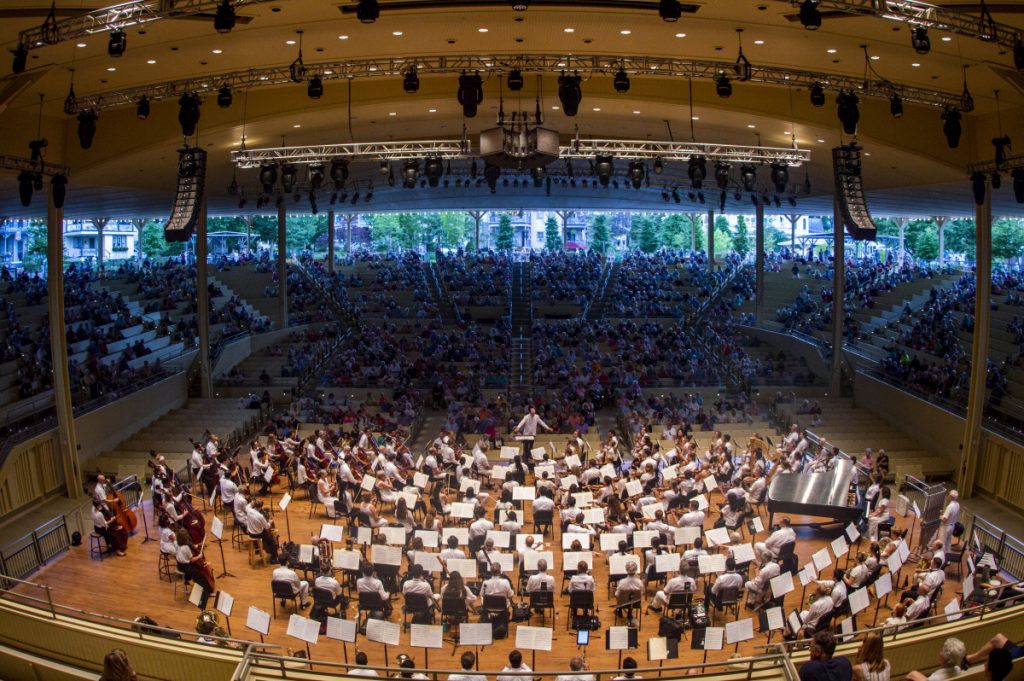NICHOLE JIANG – STAFF WRITER

Following opening night this past Saturday, the Chautauqua Symphony Orchestra will perform their second concert at 8:15 p.m. Thursday, July 15 in the Amphitheater — this time with the Music School Festival Orchestra, a tradition started in recent years.
The opportunity for the students to perform on stage with professionals under the baton of Music Director Rossen Milanov provides lessons for them as musicians who are on track to be professionals themselves.
“It’s a wonderful experience for our students to work side by side with the CSO professionals, some of whom are their teachers,” said Timothy Muffitt, the MSFO’s music director and conductor. “It gives them an idea of what the professional environment is like, how things flow, the pace of professional rehearsal, and, of course, the artistic outcome. I especially like that they get to work with (Milanov) as well. The whole experience is always inspiring for them.”
The MSFO and CSO will come together for the opening piece of the program: Dimitri Shostakovich’s Festive Overture, Op. 96. The audience will get to fully experience the talents of the brass and percussion sections of both the CSO and the MSFO, and the students are excited to be performing such an incredible piece by this iconic Russian composer.
“He’s a very exciting composer for brass players,” said MSFO trombone player Zongxi Li. “It’s kind of flashy. It’s a really good way to open the program. Another huge benefit for me is that we can sit aside established professional musicians. It’s something really special. Listening to them from the audience is beneficial, but sitting beside them playing with them is an even more unique experience.”
This learning and inspiration isn’t a one-way street.
“It’s always invigorating as a professional to see the enthusiasm, the grit and determination that the younger players have,” said Amanda Gates, CSO violinist. “It increases everyone’s levels. We mutually raise each other’s level. It’s nice to see that fire and that passion.”
The CSO musicians recognize the love that MSFO students have for producing music, and the opportunity a program like this presents.
“The ability for a student to play with professionals is invaluable,” said Lenelle Morse, CSO violinist. “As far as doing things with MSFO in the past, I’ve really enjoyed seeing their enthusiasm, and it’s something that inspires me.”
For a lot of the students in the MSFO, playing alongside the CSO gives them a glimpse into a potential future for themselves.
“It’s really important for me to play with people that inspire me,” said Gretchen Bonnema, MSFO horn player. “Hearing someone a lot better than me keeps me going because I can say, ‘That can be me in 20 years.’ They’re all super nice and welcoming. It’s nice to have a real-life example of what I can be right there in front of me. It’s a lot harder but it feels really rewarding, especially with such a receptive audience.”
This experience also allows the students to see how different the rehearsal process is when it comes to the CSO, as the turnaround time is much faster and most of the practicing and preparing must be done on their own.
“We won’t have very many rehearsals, but that’s more of a standard professional thing. It’s more intense and it’s a lot more work in a short span of time,” said Aaron Dubois, MSFO trumpeter. “Every note we hear is a lesson.”
The excitement doesn’t stop after this opening piece highlighting the brass and percussion sections. The concert will continue with Chevalier de Saint-Georges’ Symphony No. 2 and Franz Joseph Haydn’s Symphony No. 31. According to Milanov, this will be the first time Saint-Georges’ works are to be performed at Chautauqua.
“Chevalier de Saint-Georges is a Mozart and Haydn contemporary, and he was truly a Renaissance figure for his time, being a highly educated violin virtuoso and a prolific composer,” Milanov said. “He was one of the first classical composers (of) African descent and his music is largely underperformed, despite the high quality and stylistic similarities to Mozart. I am very proud that we will be able to bring to life this work for the first time in Chautauqua’s history.”
Continuing with the heavy highlighting of the brass section, the Haydn piece includes dramatic fanfares by the horn section.
“This season, one of my goals while programming was to choose repertoire that showcases the high level of artistry and musicianship that we have in (the) CSO,” Milanov said. “In this particular program, the symphony by Haydn asks for prominent solos from our concert master, principal cello, bass, flute — and of course, our horn section, whose extended role in this work is the reason why the symphony’s nickname is ‘The Horn Signal.’ ”
This concert represents the first time that CSO and MSFO have played together since 2019, in a summer of music many musicians find to be a relief.
“I can’t tell you how excited I am to be back playing with this orchestra after the tough year and a half that we all had,” said Morse. “I had tears in my eyes at the end of Saturday’s performance — especially with how the audience responded so enthusiastically.”




